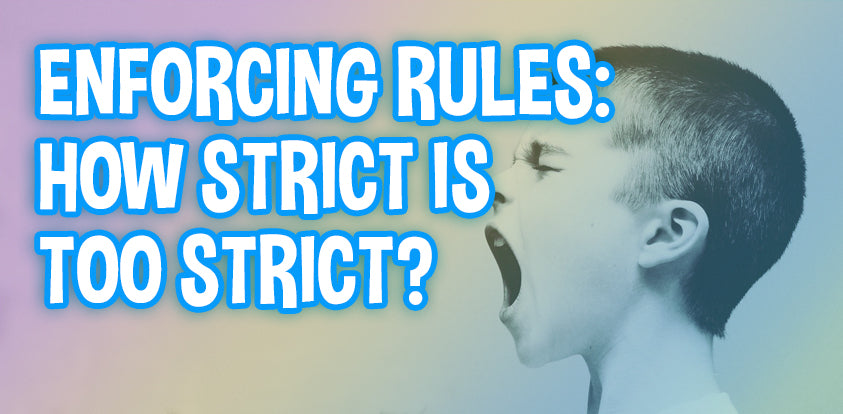
Enforcing Rules: How Strict Is Too Strict?
Share

You want your house to feel more like a home and less like a prison. Have you ever met helicopter parents that take things a bit too far? Perhaps you even grew up in such a home? Enforcing rules for kids needs to strike a fine balance. Too strict and you'll raise children scared of independence, not strict enough and they can turn every day into a waking nightmare.
What is the best way to go about managing this precarious situation? We talked in a previous article about the benefits of an authoritative parenting style, but simply having a parenting style in mind doesn't always do the trick when it comes to enforcing rules for your children. Kids are fantastic at manipulating their parents, they study you daily to figure out what is effective and what isn't.

They don't realize that they're doing it, and chances are that you don't either, but it is a huge part of the parent-child dynamic. Enforcing rules needs to be something that is always clear and consistent. If you are setting clear limits for your children then your job is largely complete. Don't stalk your children or try to keep them under your thumb. The backlash will come, and it will arrive hard.
We will cover both sides of rule enforcement for children before talking about the happy medium that you should be aiming for. Before we hop into the meat of things, I feel that I should mention that just because a kid has a stinky attitude, doesn't mean that their feet need to match. We've got some great new foot spray scents! Try our bubblegum scented foot spray deodorizer and grape scented foot spray deodorizer.

How Do You Know If You're Too Strict?
The Guiding Hand
Think about how you ask your children to do things. Simply ordering them to do homework and leaving them to it will end in abject failure for the vast majority of children. You need to put the time in, ask them if they require help, let them know that you are there to support them. I've been guilty of this one. I enjoyed school as a child and expected the same from my 7-year-old, but she doesn't enjoy doing assignments in the same way that I did, and she isn't a robot.
A guiding hand is the most important aspect of striking the balance between enforcing rules too strictly or not enforcing rules enough. If your kids don't feel supported or if they only see you as the police, they will start to leave you out of things. They will probably follow the rules and complete tasks, but only in an attempt to get you off of their back. They'll stop sharing the things that make them anxious or uneasy, and that leaves room for unhealthy influences.

Staying Warm
The truth is, your child doesn't actually care how strict you are if you are providing your rules with a degree of warmth. Problems come when you're delivering punishments with an ice-cold carelessness. When my 7-year-old finishes a time-out, we have a good conversation about what she did, why she did it, and what she might have done differently.
At the end of the conversation, we have a nice long hug. I tell her next time I know she'll do the right thing and of course tell her how much I love her. It ends in tears for both of us, but that is an extremely healthy connection to share. Do I enjoy punishing my kids? Of course not! But if I have to dole out a punishment, I'm happy to turn it into a bonding moment.

Negative Effects of Extremely Permissive Parenting
This is the type of parenting that I see most commonly. Children having a tantrum in the middle of a crowded shop obviously haven't had a boundary established. The parent might give in and buy the candy-bar or awesome toy that triggered the tantrum. Congratulations, the behavior has been rewarded and will only proceed to get worse in the future. Even something seemingly simple like slapping a bottle away can turn into disrespectful behavior if it's encouraged.
Permissive parents will turn into a doormat in attempts to soothe or befriend their children. Never put yourself on the same level as one of their friends. Remind yourself that you aren't there to be a friend, you will always be a parent first and foremost. Blurring these lines can confuse children and lead to an extreme lack of respect. Children crave structure. Do not let them run constantly wild.

Negative Effects of Extremely Strict Parenting
When I see children of parents that are enforcing rules too strictly it makes me extremely sad. You can tell just by looking at them if you've trained your eye to do so. These are the children that lack self esteem, walking with a drooping head and slumped shoulders. They presume that they can't do anything correctly because that is what their parents have taught them. Failure is a regular occurrence for them both inside and outside of the home.
A large number of kids that live under rules that are enforced too hard end up acting out and getting punished more. This makes sense as they've been taught that this sort of attention is normal, and like most kids they crave as much attention as possible. Eventually, there will be backlash and your child might act out extremely negatively. Smoking to rebel, experimenting with intercourse, or inflicting harm to themselves or others.
Authoritative and Assertive Parenting
To establish yourself as an assertive parent you'll need to keep an eye on what your children are up too without interfering too often. If they require help, don't hesitate to offer but don't take it upon yourself to step in and disregard their own efforts. Creating a warm and loving atmosphere is the largest cornerstone towards raising a child that springs into adulthood with a happy and healthy mental state.
